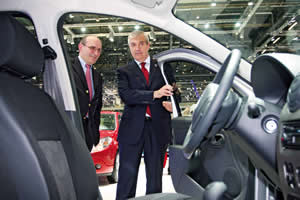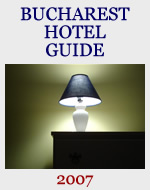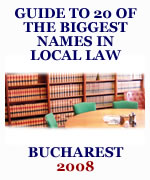Seizing early chances pays off
France arrived at the right time in Romania’s post-1989 development and its long term view has paid off for investments in automobiles, energy, communication and financial services
 |
|
|||||||||||||
France’s major investments in Romania arrived just towards the end of the 1990s, when Romania was moving from a stuttering democracy into a potential candidate for EU membership.
Liberalisation of the market had begun and many of the most attractive privatisations were up for sale.
Significant French investors made an early bet on the growth of Romania, the most courageous of which was Renault’s purchase of the Dacia factory in Mioveni, Arges county in 2001, which has encouraged the construction of a miniature car and component empire around the town of Pitesti.
With the launch of the family car the Logan, Dacia-Renault is now the second largest company in Romania after oil and gas group OMV’s Petrom.
In 2007 Automobile Dacia’s turnover increased by 600 million Euro to 2.15 billion Euro. The company sold over 230,000 car units last year, a rise of 17.4 per cent compared to 2006 and Romania is now the sixth largest market for the Renault group.
Last June Dacia Renault launched the new hatchback Sandero. Priced at 6,890 Euro, this vehicle targets the young and pragmatic – and is also looking to women drivers. The 1.4 litre 75 HP and the 1.6 litre 90 HP engines will be introduced first on the new model, followed by two diesel engines. During this year, Dacia Sandero will be progressively exported in western Europe.
Next year Renault group will launch a sports version of the Logan sedan of 1.6 litres and 133 HP.
Romanian clients prefer large volume cars and this is why the company has not yet decided if it will launch a Sandero sports model in this country. This is also the reason why the company representatives believe that Sandero sales will not overtake those of the Logan very soon.
Dacia-Renault
Car manufacturer
■ Models: Dacia Logan,
Dacia Sandero
■ 2001-2007 investments:
one billion Euro
■ 2000-2004 loss:
363 million Euro
■ 2005-2007 profit:
302 million Euro
■ 2007 turnover:
2.15 billion Euro
■ 2007 cars sold: 230,000
■ Employees: 14,400
Gaz de France:
examining diverse energy production options
Gaz de France intends to grow and diversify its operations in Romania from gas distribution to power production and supply.
At the end of last year, Gaz de France-owned gas distributor Distrigaz Sud announced its interest in supplying electricity, which has been approved by the local regulators.
Now Gaz de France is examining the means to produce electricity.
“Gaz de France wants to have a balanced electricity production in the local market,” says Gaz de France’s business development director for Romania, Tanguy Moulin Fournier.
In wind energy, Gaz de France is prospecting the market. “Romania has a great potential to develop, but no solid projects have developed yet in this sector,” says Fournier.
In nuclear power, due to Gaz de France’s merger with Electrabel Suez, the company will be involved with five other private investors in the development of reactors 3 and 4 at the Cernavoda nuclear power plant in Dobrogea. This project is stagnating for the moment due to the Government’s decision to renegotiate the investors’ stakes.
In thermo power, Gaz de France wants to acquire a plant in east Romania, Electrocentrale Galati. If approved, Gaz de France has to create a mixed-capital company with state power company Termoelectrica. The French group also wants to buy thermo power stations in Doicesti, Dambovita county and in Borzesti, Bacau county.
Gaz de France wants to be involved in supplying the gas for two gas pipelines which could ensure the inter-connection between Romania and Hungary (Arad-Szeged) and Romania and Bulgaria (Giurgiu-Ruse).
Gaz de France
Gas producer and distributor
■ Owner of gas distributor
Distrigaz Sud
■ Employees Distrigaz Sud:
7,500
■ Majority stakes in two gas
deposits: Amgaz (Sibiu county) and Depomures
(Mures county)
Orange: seeking WiMax license to increase
data download capacity
Orange is still interested in buying the so-called WiMax license due to be launched this year, when the authorities put up for sale a new spectrum to allow greater and faster data download space.
The French group’s main rival Vodafone is still evaluating the opportunity, while fixed line operator and mobile brand Zapp are also interested in the license.
Currently Orange has a spectrum of seven mhz in the WiMax band for corporate customers. “This is somewhat constraining and we would like to get more,” says Richard Moat, CEO of Orange Romania. “We would definitely be able to push for a larger share of the market if we had this license.”
The Romanian mobile market is still expanding, with the number of Simcards in use now more numerous that the nation’s 22 million population. Orange estimates the actual penetration rate of mobile phone users to be around 75 per cent of the people.
“Romania is not far from saturation in simcard terms,” says Moat. “The business card market will expand with more multiple sims as there is a greater take-up of data. The retention of existing customers becomes more important, as there is a focus on loyalty packages.”
By the end of 2009, he believes the market could reach saturation.
Orange Romania argues that human penetration can rise to more than 80 per cent, in a move which requires operators to push into lower income and geographically remote groups and find models for distribution that work for those sectors. In addition the players are going to want to find additional revenue streams due to the slowing organic growth.
“There will be a continuing focus on mobile data in order to maintain average revenue per user,” Moat adds.
In the Quadplay space where companies offer broadband, cable TV, fixed and mobile in one communications bundle, Orange Romania ran a common offer with communications and TV provider UPC for mobile telephony services and cable services in Ploiesti, Tulcea, Giurgiu, Suceava and Focsani at the end of 2008.
“Quadplay will become more popular, although there is not an enormous demand,” says Moat. “But this is a segment which will expand and because of that we want to participate in the quadplay space.”
The company is analysing whether to continue the same kind of collaboration with UPC in the future. Orange also had a common offer with satellite operators Boom TV, where Boom customers who bought Orange mobile internet services received discounts on their Internet access packages.
Orange
■ Simcard users:
over ten million
■ Target end-2008: 10.7 million
■ Broadband customers:
1.047 million
■ Revenues 2007:
1.234 billion Euro
■ Employees: 3,000
BRD - Socgen: Prudent policy for 2008
The most profitable bank in Romania with a market share of 19 to 20 per cent, BRD - Groupe Societe Generale is embracing a prudent policy for 2008.
“The growth on the retail market has started to slow down, which is expected considering the boost we have seen in the last few years on this market,” Patrick Gelin, president and general director of BRD - Groupe Societe Generale tells The Diplomat. “On the one hand we have a more indebted population and on the other we have a higher price for financing due to the turbulence on the international markets. The actual context is different from what we have seen in the past five years.”
In 2007 BRD exploited its “proximity bank” concept, adapting its products to the needs of Romanians, in a strategy which Gelin says helped them to attract 300,000 customers and to boost the net profit by 40 per cent, reaching 252 million Euro. Last year the bank has also benefited from its main rival, the market leading Banca Comerciala Romana, undergoing a period of restructuring, as it integrates into Austria’s Erste bank.
“The Romanian banking market still has a very important potential to grow,” says Gelin. “In the last five years the number of retail banks has hiked and the offer of products and services for both individuals and companies is much richer, but the Romanian market is still far away from the maturity level that is registered in the west. Many of our products that we sell in France, like long term saving products or structural financing, do not have a proper market in Romania.”
BRD - Groupe Societe Generale
■ Branches: 806
■ Net Profit 2007: about 252
million Euro
■ Loans 2007: about 7.4 billion
Euro
■ Ranking in market: second
Michelin: targeting
energy efficiency
Since 2002 Michelin Romania has multiplied its turnover five times, from 64 million Euro to 340 million Euro in 2007 and now has three factories in Romania.
This year the French company launched Michelin Energy Saver for the passenger car market. “At a time when the price of a barrel of oil is reaching an all-time high, Michelin Energy Saver is the only tyre that can reduce fuel consumption and consequently CO2 emissions by four grams per kilometre while improving user safety and tyre longevity,” argues Jean Marc Gebhart, Michelin Romania’s general manager.
Michelin Romania offers tyres for two-wheels, passengers and trucks, agricultural and industrial tires.
“The main objective is to be the best on the market, but we don’t want to be leaders at all costs,” says Gebhart. “Being the leader is not only about sales figures or sales volume, but it is also about acting responsibly, keeping in mind the respect for people, for the environment, for facts, clients and shareholders.”
Michelin Romania
Tyre and steel cord manufacturer
■ Three factories in Romania
■ Total investment:
200 million Euro
■ 2007 turnover:
340 million Euro
■ Employees: 4,000
Saint-Gobain: construction material prices dropping
High prices for construction materials, initially prompted by the short supply and large demand, have dropped this year and are likely to keep going down for less energy intensive products.
“This is a very elastic market, as some construction materials are highly dependent on energy,” says Olivier Lluansi, regional manager south-east Europe at Saint-Gobain. “The costs of energy, labour and transport can either raise or drop the prices dramatically.”
While glass is very energy intensive, other materials, such as plaster and mortar, consume less energy and are thus lower, relatively, in price.
“At some point the market will become mature and we are starting to see that consumers are becoming more interested in quality,” says Lluansi. “They want comfortable and well insulated homes.”
This year the French glass manufacturer will invest around 30 million Euro in a glass coating line, to be produced at its existing Calarasi facility. Using a product imported from Poland, the sheets of glass are coated with thin layers of oxides to improve their insulation. This is a more energy efficient alternative to 4mm thick double glazing, argues Lluansi.
The manufacturer owns seven factories in Satu-Mare, Turda (Cluj county), Ploiesti (Prahova county), Bucharest and Calarasi where it produces glass, plaster and mortar and four commercial warehouses, two of which are in Braila and in Tulcea and Bucharest. In 2007, the company acquired its former supplier, MTI, a local manufacturer of wood products such as cupboards and staircases. “We export the semi-finished products manufactured at MTI to France,” Lluansi adds.
Saint Gobain
Glass and construction materials manufacturer
■ 2007 turnover:
150 million Euro
■ Plants: seven
■ Warehouses: four
■ Employees: 1,100
Sofitel: parent company plans to expand Novotel to Timisoara
Although the Accor Group does not intend to open any further hotels under its Sofitel brand in the near future in Romania, the hospitality group has expansion plans in Romania for its Ibis and Novotel models.
“One Ibis Hotel will be built in Bucharest in collaboration with the World Trade Centre and there is a Novotel Hotel project in Timisoara,” says Bruno Vinette, general manager of Sofitel Hotel Bucharest. “Other projects are expected to come.”
Although Bucharest lacks two and three star hotels, the group is looking for land plots to expand its two-star Etap brand in other cities of Romania, but no location has been selected yet.
Meanwhile the four-star Sofitel in Piata Montreal in north Bucharest reached in 2007 a 75 per cent occupancy rate and is targeting this year an 11 million Euro turnover, which is a ten per cent increase on 2007.
Meanwhile Sofitel Hotel has budgeted 500,000 Euro for investments in 2008.
“We are planning to increase the revenues of the hotel to face the increasing competition,” adds Vinette.
Sofitel Hotel Bucharest
Part of Accor Group
■ Ranking: four stars
■ 2007 turnover:
ten million Euro
■ 2008 forecast turnover:
11 million Euro
■ Employees: 230
Auchan: stores set for Bucharest west and Suceava
French retail chain Auchan will open one hypermarket in Bucharest in Militari area and another in Suceava by the end of 2008.
The company plans to expand next year in hypermarkets in more cities of Romania, including Constanta and Timisoara, where Auchan has opened its first supermarket.
“Our aim is to expand as fast as possible in as many cities as possible in Romania,” says Mariana Dragan, communications manager at Auchan Romania.
The hypermarket in Bucharest’s Titan is the largest in the country, with a total area of 16,000 sqm and 90 sales points. Investments in such store range between 30 and 40 million Euro.
Around 2.5 million customers per month visited Auchan hypermarkets in 2007, while this year, due to the expansion, four million visitors are expected to come every month.
Auchan
Retailer
■ Year established in Romania:
2006
■ Five stores: four hypermarkets
in Bucharest, Targu Mures, Cluj-Napoca, Pitesti (Arges county); one supermarket in Timisoara
■ Employees: 2,700
Apa Nova: planning discussions to extend obligations
Bucharest’s water and sewage utility Apa Nova, part of the global water services group Veolia Eau, has been criticised for not respecting the obligations in its 25 year contract signed in 2000 with Bucharest City Hall.
But the utility company is not obliged in its contract with City Hall to extend the water and sewage networks to new streets that appear in Bucharest at a rapid rate, due to the fast development of the city.
“We have proposed the municipality to extend our obligations, but an addendum to the contract is necessary for which the discussions will start soon,” says Andreas Baude, general manager of Apa Nova and general manager of Veolia Eau Romania.
Between 2000 and the end of 2007, Apa Nova has invested about 191.14 million Euro and has plans to invest up to 27.31 million Euro this year.
Since 2000 the company has built a new water treatment plant in Crivina near Bucharest and modernised old water treatment plants. All pumping, re-pumping and booster stations have been rehabilitated, while works continue to extend and modernise the water and sewage networks. “Apa Nova has respected and will respect its obligations related to all levels of services,” argues Baude.
Veolia Eau intends to become active in other Romanian cities as long as the local authorities organise public international tenders for water and sewerage services.
The water distribution network in Romania is quite old, but in Bucharest Apa Nova has launched a programme for pipe replacement. “The Bucharest Public Health Authority, which checks the potable water every day, and our analyses on the technological production flow and in the water distribution network can verify that in Bucharest the water is clean and drinkable,” he adds.
Apa Nova’s water production and distribution network capacities are enough to supply at least three million people, while Bucharest has officially now two million inhabitants, the actual figure is expected to be much higher.
Apa Nova Bucharest
Water utility
■ 83 per cent owned by
Veolia Eau
■ 17 per cent owned by
Bucharest City Hall
■ 2007 turnover:
111.8 million Euro
■ 2008 prudent forecasted
turnover: 109.3 million Euro
■ 2007 profit: 23.2 million Euro
■ 2007 investments:
25.4 million Euro
■ 2008 prudent forecasted
profit: 19.1 million Euro
■ Employees: 2,000
Louis Berger: eagerness from authorities for motorway concession to start
Louis Berger is one of the main engineering companies selected as the infrastructure consultant for both central and local authorities in Romania. The most complex infrastructure project that Louis Berger is now working on is the technical, financial and judicial assistance for the concession of Ploiesti-Brasov motorway, according to Calina Nistor, deputy director for Louis Berger, regional office for central and eastern Europe. Nistor says the Ministry of Transport shows a clear eagerness and ambition for the concession process for motorways to finally start in Romania. If all goes well, works on this motorway will begin by the end of this year, she says.
Louis Berger is also project manager for the modernisation of the Lia Manoliu National Stadium in Bucharest. The facility is planned to have 55,000 seats and 1,835 parking spaces. “The workers have totally demolished the old stadium and have just finished the works to build the construction site that made available for the construction works to start,” says Calina Nistor.
Louis Berger is also working on sewage and water supply networks in cities such as Brasov, Botosani, Baia Mare, Deva, Hunedoara, Caras-Severin and Piatra Neamt.
The largest amount of their projects continues to be based on the long-lasting relationship the engineering company has since 1991 with central and local authorities. But last year the company took advantage of the real estate boom in Romania and has started involvement in private investments.
Louis Berger
Infrastructure engineering company
Advise on due diligence, viability of projects, design, supervision of construction, claims assessment and construction management
■ 2007 turnover:
39.5 million Euro
■ 2008 forecast turnover:
43 million Euro
■ 2007 profit: 0.5 million Euro
■ 2008 forecasted profit:
0.5 million Euro
■ Employees: 285
Sodexho: planning to launch vouchers for tourism
Voucher services company Sodexho is planning to launch a voucher for tourism which will be exchangeable for hotel rooms in Romania. This is in addition to its current portfolio which includes vouchers for meals, supermarket sales and kindergartens.
“We hope this voucher will be ready by next year,” says Francois Podeur, general manager of Sodexho Romania. “It will be a great incentive for Romanian tourism.”
At the moment Sodexho is the leader on the Romanian market with a market share of about 42 per cent, selling its vouchers to businesses, which then distribute them to their employees as a method of reducing the amount of taxes employers have to pay.
For the near future Sodexho is not interested in any acquisition on the Romanian market because the market has a great potential to grow. In 2008 the company aims to achieve a 10 to 20 per cent increase in its business.
Sodexho’s most successful product is the meal voucher and some of its biggest clients are Dacia, Bucharest transport authority RATB and BRD - Groupe Societe Generale.
The biggest challenge that Sodexho has faced on the Romanian market is the poor quality of roads because the company has to deliver its products over a large territory. “For those who have just discovered this business it is a very difficult market,” says Podeur. “When a company does not have the proper know-how, it can only sell at a very low price, cannot guarantee the quality of services and does not have the possibility to improve them. Then it will sell the business or continue to lose and one day close completely.”
Accor Services:
gift vouchers seeing
30 per cent rise
Almost ten years after Accor Services issued its first meal vouchers in Romania, with the Ticket Restaurant brand, many companies now include them in employee benefit packages. Now the firm’s annual growth rate has stabilised in the last few years to approximately five to ten per cent.
“Gift vouchers are becoming increasingly popular as a benefit offered by our client companies to their employees,” says Philippe Blecon, general manager of Accor Services. “Gift vouchers growth rate is therefore high, at around 30 per cent in the last year.”
Over 35,000 companies use Accor Services vouchers as a benefit to 1.5 million employees in total. In 2007, the best selling products of the company were Ticket Restaurant, food vouchers and gift voucher Ticket Cadou. Last year the company launched two new service vouchers, Ticket Cresa which is exchangeable for nursery care costs for children under three years old and Ticket Medica, a ticket exchangeable for paid-for healthcare services.
Accor Services
Service vouchers
■ Year established in Romania:
1998
■ 2007 turnover: 26 million Euro
■ Employees: 220
GPV Romania: to enlarge product offering for direct marketing
Manufacturer of envelopes GPV Romania, which now operates from Timisoara, Iasi and Bucharest, plans to enlarge its production capacity and product offering for direct marketing.
“GPV Romania has an essential role in the development of GPV Groupe in the central and eastern Europe, especially as a production centre,” says Thierry Blain, general manager of central and eastern Europe for GPV “We are launching here a unique offer of eco-friendly products which can be completely recycled, without any synthetic or chemical ingredient.”
Five years ago the company established a mailing service delivered through GPV Mail Services which now plans to consolidate its position for financial sector clients.
For the near future GPV has no plans for an acquisition on the Romanian market and instead will focus on organic growth.
GPV Romania
Envelope manufacturer
■ Turnover 2007:
about 11 million Euro
■ Net profit 2007: about 400,000
Euro
■ Forecast turnover 2008:
about 12 million Euro
Schneider Electric:
to open new customer development centre
Supplier of electrical distribution and automation control products and services Schneider Electric Romania will this year invest over one million Euro in launching new products and electrical solutions, recruiting more than 30 and opening a new professional customer development centre, as well as in marketing and promotion.
“Our plans include a one world wide customer relationship management tool providing transparency of information across boundaries allowing us to better manage global customers and a people software providing better management and development of our employees,” says David Nicholl, general manager of Schneider Electric.
In 2008, Schneider Electric completed the launch of the products from its merger with emergency lighting company OVA. Schneider Electric Romania has also completed the process of merging with the Romanian division of Merten, which offers intelligent electrical technologies for medium and high-end housing.
Schneider Electric
Supplier of electrical distribution and automation control products and services
■ 2007 turnover: 65 million Euro
■ Employees: 150
Corporate Office
Solutions: looking to expand to northwest
Furniture, architecture and design services company Corporate Office Solutions (COS) will open a new office in Sofia and is looking for a partner to expand to north-west Romania.
“I want a partner who already has a presence in the market, who knows the local market and who can help kick-start the business,” says Cristophe Weller, managing partner of Corporate Office Solutions. “I do not want to build from scratch.”
In the last years the engine of growth for COS has been the financial sector, as well as telecom and car retail. Among its biggest clients are BRD - Groupe Societe Generale, Cosmote, Vodafone, Orange, BMW and Mercedes. The health and educational sectors are the next targets.
“The big companies have understood that the conditions of work are very important and if they want to retain their employees for long periods of time the salary it is not enough as an incentive,” says Weller.
Corporate Office Solutions
Suppliers for full office fit-out
■ Turnover 2007:
12 million Euro
■ Forecast turnover 2008:
17 million Euro

















